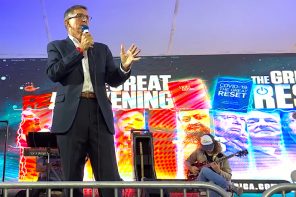Caring and sharing: that’s the theme of 99% of the faith community response to the COVID-19 catastrophe, and who can fault this commitment to serve and heal and provide immediate relief?
Here is an excerpt from a fairly typical message (this one is from the executive director of the N.C. Council of Churches):
This is also a time for us to get creative about caring for those around us. The young and healthy among us should be intentional about naming the old and infirm. Those who cannot risk public exposure still need basic supplies and food. All across the land, people are forming support groups to run errands, pick up supplies, and otherwise care for those who cannot and should not leave their homes. Let’s name those people even as God names each of us.
Again, to be clear, there is nothing whatever wrong with this messaging: it’s moving, it’s spiritually grounded, and it’s perfectly appropriate.
The problem arises when faith leaders take the next step, using language like “if only we could…” or “it ought to be possible to…”
What they mean is “if only we could become the kind of country that practices caring and sharing on a vast scale,” or “it ought to be possible to translate all this good moral energy into a national moral awakening.” But this overlooks both the basic distinction between charity and justice and the impossibility of translating moral energy into institutional change without a critique of power and an organizing plan to redistribute power.
Sure, it ought to be possible for the country to “learn” from the many redemptive actions that saintly everyday people are taking in this pandemic. But the country is not constituted as a moral community, let alone as a moral being that “learns” in this way.
Thinking along those lines ignores both the structural and ideological barriers to building a just society amid the ruins created by an unprecedented catastrophe. These barriers are closely related, of course. The structural barrier is the near-total capture of our political institutions by powerful interests that have zero interest in caring and sharing as an operational ethic.
The ideological barrier is the continued identification of wealth with virtue, an identification whose power rests on a corrupted religious worldview. What theologian Walter Brueggemann means when he writes about the “royal consciousness” that infects American religion is precisely this readiness to accept the rule of wealth and accept all of the related injustice while continuing to indulge the illusion that the United States is a land of unparalleled social mobility and democratic hope.
In fact, “accept” is too mild a verb. We actually laud our oligarchs and sing our hosannas for their benefactions. We are perfectly willing to forget that the wealth they enjoy was essentially stolen from the rest of us—and that what our overlords would have us praise as “generous” givebacks represent no more than leftover pennies in their well-lined pockets. The brilliant writer Anand Giridharadas has exhaustively mapped the ways in which the wealthiest succeed in presenting themselves as virtuous. This is why his matchless takedown of billionaire “generosity” is an essential splash of cold water in a time like this.
I am grateful for Giridharadas and for others like him who explode the most entrenched myths about who we really are and how this society really works. I admire the gutsy reporting that questions the whole legitimacy of the ginormous global charity set up by Bill and Melinda Gates. But my nagging worry is this: How will religious leadership, including progressive religious leadership, disenthrall itself from its own investment in royal consciousness? When will we treat the reality of power and the relationship between power and suffering with the seriousness it deserves?





